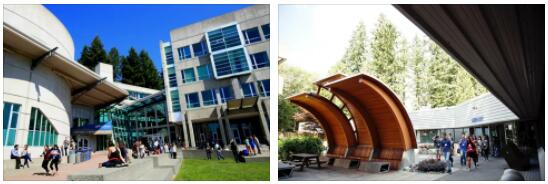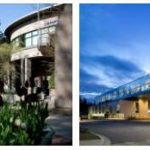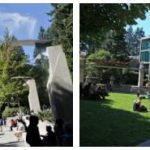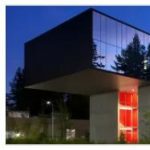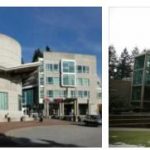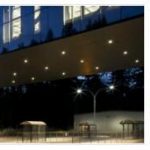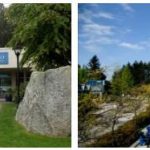When I was planning my semester abroad at Capilano University in Vancouver, Canada, I had high expectations, because both the university and Vancouver were highly praised by all the acquaintances and friends I spoke to. The fact that these expectations were actually exceeded speaks for both the facility and the city itself. I had an amazing time in Vancouver this summer and I definitely don’t want to miss it again. That’s why I can only recommend it to anyone who is considering doing a semester abroad.
Preparations
But before the trip could even start, I had to apply first and take care of everything organizational. I came to MicroEDU with very specific ideas, as a friend of mine who is studying at the same university as I was able to gain great experience at CapU last year. Nevertheless, MicroEDU was a great help to me and I can only warmly recommend it to everyone, especially since atypically I did not want to go to Vancouver in the “main semesters” Fall and Spring, but rather for the Summer Term in the summer.
My supervisor Lisa Bradler, at this point again a big thank you to you, was really always trying and I was able to come to her with all questions about studying abroad. She also explained to me exactly which documents had to be submitted and when, so that I had enough time to organize them. After the successful application, both MicroEDU and CapU helped me to dial into the courses, which was a bit different for me than usual, as my desired courses were already full due to the limited number of offers in the summer sessions. But with their support, that worked out very well in the end.
After that, it was necessary to arrange organizational matters, such as booking the flight and the first accommodation and applying for an eTA. After a long-term room in a shared apartment, I first looked on site to see what was really available, as you can view the offers right away.
The host university
The Capilano University campus is located in North Vancouver in the middle of a forest. It’s one of the smaller universities in the greater Vancouver area, but because I also come from a small university, it’s the perfect size because it’s easy to find your way around right from the start. The university is well equipped and there is everything you need: a library with computers, printers and scanners, a bookstore, various food and drink options and indeed even microwaves that you can use to warm up your own food, work surfaces and spaces, a sports hall and also plenty of opportunities to be outside.
This is a real advantage, especially on warmer days, as the campus, surrounded by tall trees, is really really beautiful. The university also has two bus stops that are served by several bus routes every ten minutes. As a full-time student receives the U-Pass with which you can use all public transport in the greater Vancouver area, it is also a good idea to take the bus to the university.
According to andyeducation, the Center for International Experience is responsible for international students and the staff there are very nice and helpful. Otherwise, you can speak to the lecturers at any time, who are always ready to listen to students.
The studies
As a free mover or visiting student, you are enrolled in a program in which you select at least three courses to qualify as a full-time student. I was at Capilano University during the Summer Term, which is a little different from the Fall or Spring Terms. The summer trimester is divided into two sessions, one from May to June and then from July to August. This means that the courses do not last over four months, as in the other terms, but over two months. Accordingly, the workload was a bit more intensive, as each course took place twice a week, each lasting three hours.
For each course you usually have to read and prepare chapters from a textbook in preparation and then follow up on it. In addition, there are regular homework, small tests, group work, presentations, submissions and homework. Halfway through, in my case already after a month, you write a midterm test in each course and at the end of the course a final test. The final grade is then made up of these two tests and the participation during the course, which includes both oral participation and submissions.
During that time I took three courses, a geography (Canada: A Nation of Regions), history (Issues and Themes in US History: 1607-1877) and a politics course (Introduction to Government and Politics).
I would like to emphasize the interaction between lecturers and students in a particularly positive way. Due to the smaller courses, the teachers know all students by their first names and the fact that the lecturers are also used creates a completely different relationship than what one is used to at German universities and colleges.
Since the summer term is generally a bit quieter, because Canadian students mostly use this semester as vacation time or to work, I was the only visiting student. For this reason, there were no leisure activities organized by the university, which is probably different in the Fall and Spring Term. But I didn’t mind that at all, as Vancouver has so much to offer, especially in the summer, and it definitely never got boring !
Stay in Canada
In Canada, especially Vancouver, there can be more than good life. The Canadians I’ve dealt with are actually as nice, friendly, open-minded and helpful as they always say. They are very easy to get into conversation with, and while I’ve heard that it’s difficult to make friends in Vancouver, I can’t confirm it. Vancouver is a very multicultural city where different cultures actually live together. As a result, the city also has many international culinary highlights to offer.
Apart from that, Vancouver offers a lot of different offers for everyone in the summer. Every weekend there is a different festival and / or concert and / or theater, you can relax on the beach and watch the sunset, go bike and kayak tours, is very quick in the mountains and in nature and can do great hikes and various crafts Try beers in a variety of bars. And even if you just walk through the streets of another neighborhood, there is so much to discover.
The weekends can be used wonderfully for smaller excursions, for example to Whistler, to one of the many beautiful lakes or to Vancouver Island. We always teamed up with several friends and rented a car. And if you still have a few weeks of extra time, I can only recommend renting a camper or a car and driving through the Rocky Mountains. That was really a particularly impressive experience!
A few tips at the end
- The fall and spring semesters are the regular semesters in which most of the events are offered. This also applies to extracurricular offers. The campus will then be a lot livelier because more students are enrolled in these semesters.
- The books that are necessary for the courses are sometimes really expensive. But you can buy used books at the Student Union or the bookstore at the beginning of the semester and sell your old books again at the end of the semester.
- I can highly recommend booking an Airbnb, hostel or similar for the first 2-3 weeks to look for a room in a shared apartment or a host family on site. For this, I recommend the “craigslist” platform or the Capilano University apartment offer page. A room between $ 550 and $ 750 is a very good price. It is important to always inspect the apartments beforehand in order to prevent false advertisements as much as possible.
- At Capilano University, it can be worth living in North Vancouver, as the journey to the university simply doesn’t take that long and rents in North Vancouver are also cheaper. Lonsdale can be a very convenient area as the Sea Bus is a quick way to get to downtown. When looking for an apartment, you can also pay attention to the bus connections.
- In order to plan the journeys with the public transport, I can highly recommend google maps. The mobile app was pretty reliable and even shows if a bus is on time or delayed.
- Another tip is to buy the compass card directly from a machine at the airport. You can then load your Uniticket onto this local public transport card so that you can use it directly.
- Depending on where you live, the last bus from downtown goes back to North Vancouver between midnight and 1 a.m. If you want to save yourself the taxi ride, you can register with a car sharing company, for example car2go or evo. However, you should already take care of it in Germany, as an extract from the point register is required for this.
- At the Real Canadian Superstore you can usually get groceries cheaper than in the other supermarkets.
- There are drinking stations where you can refill your bottle almost everywhere in Canada. So taking or buying a reusable bottle can be very convenient.
- My hiking boots were in constant use in Canada because there are so many very beautiful hiking trails there.
